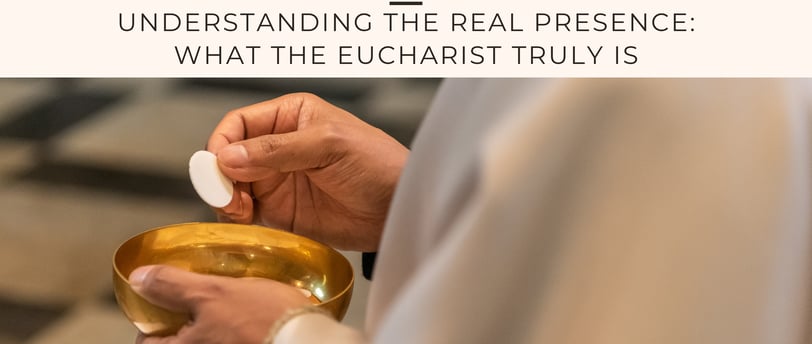Understanding the Real Presence: What the Eucharist Truly Is
Blog post description.
SIGNIFICANCE
6/17/20252 min read


One of the most profound and beautiful truths of the Catholic faith is the doctrine of the Real Presence—the belief that Jesus Christ is truly, fully, and substantially present in the Holy Eucharist. This is not merely a symbol or a reminder; it is a living reality. When the priest consecrates the bread and wine during the Mass, they become the Body, Blood, Soul, and Divinity of Jesus Christ.
Rooted in Scripture
This belief is not a human invention, but a truth revealed by Christ Himself. At the Last Supper, Jesus took bread, blessed it, broke it, and said: “This is my body, which will be given for you; do this in memory of me” (Luke 22:19). He then took the cup and said, “This cup is the new covenant in my blood, which will be shed for you” (Luke 22:20).
Even more striking are His words in the Gospel of John, chapter 6: “Whoever eats my flesh and drinks my blood has eternal life... For my flesh is true food, and my blood is true drink” (John 6:54–55). Many who heard Him found this teaching hard, and some walked away. Yet Jesus did not correct them or explain it away as metaphor—He meant it literally.
The Miracle of Transubstantiation
The Church teaches that during the consecration at Mass, the substance of the bread and wine is changed into the substance of Christ’s Body and Blood. This change is called transubstantiation. Though the appearances (or "accidents") of bread and wine remain, what they truly are is transformed.
This miracle is made possible by the power of the Holy Spirit and the words of Christ spoken by the ordained priest, acting in persona Christi—in the person of Christ.
Why It Matters
The Eucharist is not just nourishment for the soul; it is Jesus Himself. In receiving Holy Communion, we are united with our Savior in the most intimate way possible on this side of heaven. It is a foretaste of eternal communion with God.
The Catechism of the Catholic Church calls the Eucharist “the source and summit of the Christian life” (CCC 1324). From it, all the Church’s power flows, and to it, all her work leads.
A Call to Reverence
Because the Eucharist is truly Christ, we must approach it with profound reverence and faith. This means being in a state of grace (free from mortal sin), observing the Eucharistic fast, and receiving with devotion.
The Church has also long encouraged Eucharistic Adoration, where the consecrated Host is exposed for worship. It is a time to rest in the presence of the Lord, to speak heart-to-heart with Him, and to adore Him who gave His life for us.
Faith
Sharing God's grace with joy and kindness.
Grace
© 2025. All rights reserved.
